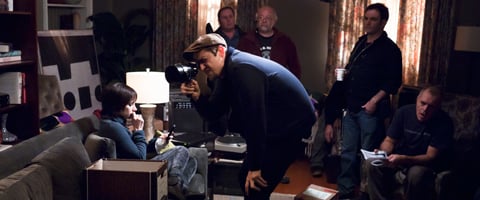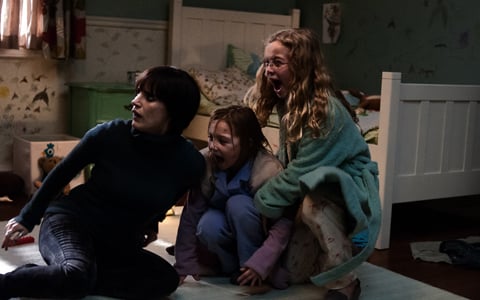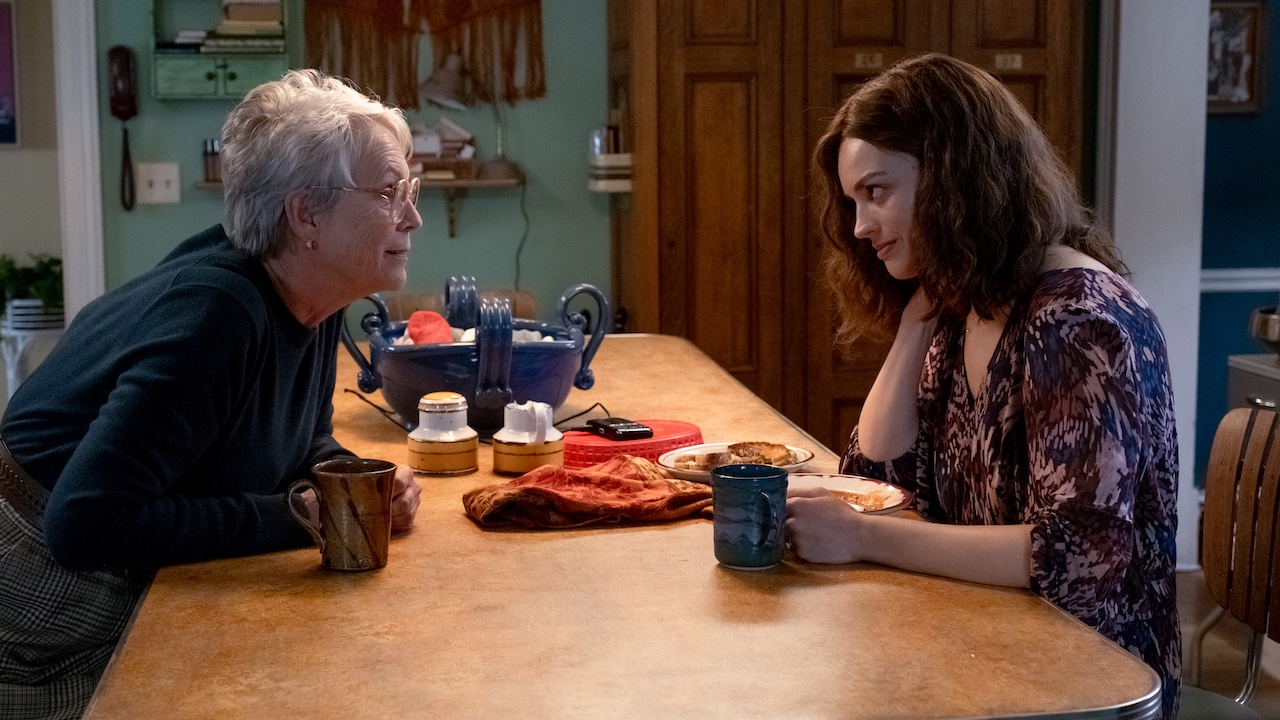On The Set Of Mama, First-Time Director Andy Muschietti Taps Into Childhood Fears

Is Mama a horror movie? Depends on who you ask. Star Jessica Chastain, who freely admits to being a scaredy cat, most definitely says yes. The film's visual effects supervisor Ed Taylor says absolutely not-- "I like to call it a ghost story. It’s about hope, it’s about what a parent is - how do you define a parent? And it’s about fighting for what you love." Producer Miles Dale doesn't use the word "horror" once over the course of a long interview. And director Andy Muschietti? He says that at the end of the film, when you realize the true nature of the titular character, "You shit yourself. Ideally."
You couldn't blame everyone for still trying to figure out their movie's tone when I talked to them last October, with Mama halfway through its shoot and Chastain, as she described it, starting to "feel like I'm finding my feet." (You can read our full conversation with her and more details about the movie in the first part of our set report). But whether Mama is a psychological thriller or a ghost story or a metaphor about parenting-- or, most likely, some combination of the three-- it was certain that the movie was out to terrify you, and that all starts with the title character, the malevolent ghost who has cared fro two little girls in an abandoned house for five years, and doesn't respond well when a new woman-- Chastain's Annabel-- tries to take control.
Mama herself is actually played by a man, Javier Botet, who appeared as the emaciated girl demon in [REC] and who executive producer Guillermo del Toro calls "the thin Doug Jones. Because he makes Doug Jones look like John Candy." (If you're not familiar with Jones, who played the Pale Man and the Faun in del Toro's Pan's Labyrinth and Abe Sapien in Hellboy, click here). Botet wasn't on set the day we visited, but we got a look at his work in a special effects test reel, in which Mama floats down a hallway with the kind of herky-jerky, unworldly movement you associate with nightmares. With hair floating up and defying physics, and a body that can crawl up walls like a spider but also move forward incredibly fast, Mama looks every bit a monster-- but she's also beloved by the two little girls who Annabel must learn to care for.
"She's a horrible hero," says Barbara Muschietti, the co-writer and co-producer and sister of director Andy. Andy explains a bit further:
You see that the girls love this thing. You're not sure if it's real or not, but they follow her, they mimic her, you see a lot of traits from the mysterious character that is reflected on the girls. And when you see it, it doesn't matter all you know about their love, because it's so horrifying that you shit yourself. Ideally. So that's the game we're playing.
The test we saw of Botet as Mama was done entirely practically, with shots layered over each other to get the proper spooky effect, but the final product will include some CGI work, which is where Ed Taylor comes in. The visual effects supervisor from Canada-based company Mr. X explained that Mama's free-floating hair-- supposedly linked to her death underwater somewhere deep in the past-- is the most challenging aspect of the character, since hair can be one of the most difficult things to realistically create in CG:
Most CG hair is short, and there is a reason for that. What happens is that you start getting these collisions that add up and the math takes an incredible amount of time. So we are really trying to create this character of the hair, and that will be a big task, so that’s it. Just trying to bring it to life and not make it a passive entity is enough of a challenge for us.
What's remarkable is how much of Mama will be created practically, with Botet's performance making up the bulk of the character, and the CGI coming in to augment the hair and other terrifying aspects -- "There might be some aura effect; there will be a bruising effect that will come into play." I don't know what a bruising effect is, but it's terrifying, almost as the fact that Mama emerges in the house through cracks in the wall, and that moths arrive before she does. The moths are another one of Taylor's digital creations, and here's how he described the way they'll be used in the film:
They will cover the wall, cover all the lights. Lucas, the main character, has epilepsy, so in one scene, all these moths start showing up because Mama’s trying to get at Lucas. You see them fluttering their wings in time with his eyes, as he goes through his convulsions. So that is one thing we will be doing: the bruising and the moths."
For Andy and Barbara, who created Mama for the short film that has now changed their lives, the character emerges from a very specific point in their childhood: a series of paintings by Italian artist Amedeo Modigliani that hung in their childhood home. Taylor described the artist as "the biggest cue for Mama's look," and as Barbara explained, "we had a Modigliani growing up, and it scared the shit out of us. When Andy started drawing Mama, it was very clear that there was a big, elongated Modigliani air to Mama. It's very scary visuals." The siblings grew up with horror films like Vincent Price movies every Friday, but Barbara cites Close Encounters of the Third Kind and Jaws as the kind of movies that scared them most-- movies that have clearly affected the role Mama will play in the film.
Your Daily Blend of Entertainment News
Given the small budget for the film, Mama will be making limited appearances-- but as Taylor explains, that's only for the better: "Andy is pretty smart and he knows it is better to play with your imagination a bit more. I think some of the scariest films barely show the monster. I think he has held back on purpose, as well as for budgetary reasons." And executive producer del Toro says it simply: "Horror is always better when nothing is explained."
But if you want a little more explanation about how a first-time director like Andy wound up working alongside his sister, and under the guidance of no less than Guillermo del Toro, read our on-set conversation with both Andy and Barbara on the next page. We'll have one more report from the set, including our lengthy interview with del Toro, coming tomorrow. You can catch all the scares of Mama for yourself when it opens January 18.

You did this amazing short film, and a lot of filmmakers go out and make a short film, they use it as a calling card, and they don't have any kind of plan for what they want to do with the story. How much did you know story wise what you wanted to do with a feature film, before or during when you were doing the short film.
Andy: Actually it was a different story. We were writing a different screenplay, and "Mama" the short was sort of a style exercise, to support the project. It was a ghost story, also a horror supernatural thriller, but the story was not "Mama." We did this as a support piece and it finally became a short film somehow, when we put the credits on and sent it to festivals. We started to raise interest, and a lot of people were asking what was the story behind it. It's a big question mark. People usually were asking how was it possible that those little girls are that thing's daughters. So that motivated us for writing the story. Usually they were more interested in seeing what happened to the girls--
Barbara: Than in reading our screenplay.
Andy: Which wasn't bad at all.
How difficult was it to break this story? Because that original short is such a mood piece and such a great story, how hard was it to find the story that you wanted to go with?
Andy: It happened in one day. It wasn't difficult. The outline of the story just happens. It was like a spark, you find the idea and say "Ah." How do we turn this question mark into an interesting, long story? I think it can happen in an afternoon.
Barbara: We were in Madrid.
Andy: It wasn't really hard. It was harder to develop. Because of course, in the short film, it has this impact because it's so short. It's not surrounded by anything. There is a big deal of intrigue. In the movie you need to explain a lot of things and make a set-up and transit like common places, in order to tell a story with characters and drama. So I guess there's a big deal of pressure that you have to let go when you make a feature film. One of the goals is to maintain the impact of the short. The idea is to make that scene as impacting as it is in the movie, and of course change it, for all the people who saw the short film, when they saw the movie it would be disappointing to see the same scene. So there's a couple of twists in this version.
Barbara: For writing the feature-length, it was our friend Juan Carlos Fresnadillo, he said-- he was the guy that did the first part, he said "You have to do this into a feature length. This is ridiculous, you have to do it into a feature length." So we sat down, we said "Let's try it. If it doesn't work for us, we'll let it go, but let's give it a try." So we did, and we wrote a treatment in 10 days, because our agent was already showing people the short. And people were seeing the short, and the response we were getting was more toward the more graphic horror. We wanted to write a treatment to access interest from people like Guillermo that would embrace something different to a classic genre movie. We wanted to do something a little more complex with special characters. So we wrote the treatment really quickly, and after that Guillermo got in touch with us and that was it.
Guillermo told us that he has a meeting with you every morning and every afternoon. Can you tell us a little about those meetings and your relationship with him on this film?
Andy: It's great because Guillermo is a big reference, and the good thing about him is he's very demanding. He doesn't have any problem to say "this is wrong," or "I would have gone another way." He's very honest with that. He's very generous when it comes to advice. And he surprised also-- he told us he learns a lot from his proteges to say something. So it's a kind of a feedback. It's great to have him every day, and having his feedback. And sometimes along the way you can get lost with the confusion of what you're doing. It's a good thing having a response from a guy like him.
How long have you two been working creatively together?
Barbara: It's been working together for 10 years, and writing together for about 8. But we've always been siblings.
Andy: We lived for 10 years in different countries-- she started in L.A., and I was in Buenos Aires. And I moved to Spain while she was in London, and then together in Barcelona, where we started a company. And it was like that for 10 years.
At what point diid you feel ready to make a movie, or do you feel ready to make a movie?
Andy: I'm not ready yet. [Laughs] I guess it's something that just happens, and you're asking yourself. I guess I was more ready to make a film 10 years ago, when I thought it was easier. And now that I'm doing it I'm encountering all the little surprises and obstacles along the run. But I guess you never know when you are ready.

I'm curious about the character of Annabel. She seems like she wouldn't be the star of a movie like this-- the punk rocker usually dies. Where did this character come from?
Andy: That was a chemistry need I guess. This is a woman who, by accident, from one day to the next she has to take the responsibility of raising two little children who aren't hers. It's a reluctant hero, and you will notice when you see the movie-- now you know it, but when you see the movie she's not the hero at all. But there's kind of a twist that makes her jump in the driver's seat, just like that, and she's the least apt person for the job. That's where it comes from I guess.
Do you have specific artistic references for the film? Your producer was talking about Modigliani paintings that you had that kind of inspired you. What other paintings or films inspired Mama?
Babara: We had a Modigliani growing up, and it scared the shit out of us. When Andy started drawing Mama, it was very clear that there was a big, elongated Modigliani air to Mama. It's very scary visuals.
Andy: Yes, especially for the character. There's tons of influences that come together here. I'm a big fan of Edward Gorey, and I don't think he has been portrayed in film. Well, Tim BUrton is a fan too. But the horrific part of Edward Gorey, how he frames things is very disturbing. And I think that Mama will have a lot of that.
Do you see the character of Mama as a monster or someone we can be empathetic toward?
Andy: It's a mix. It's a character you don't empathize with, because you're not on the right perspective. But if you could understand what's going on, it's the story of a mom trying to get her children back. I think we played with that. If you asked the girls, actually--
Barbara: They love her. She's a horrible hero, really. That's what she is.
Andy: One of the elements of horror is that we are building a big question of what is the character. You learn a lot of things, you see that the girls love this thing. You're not sure if it's real or not, but they follow her, they mimic her, you see a lot of traits from the mysterious character that is reflected on the girls. And when you see it, it doesn't matter all you know about their love, because it's so horrifying that you shit yourself. Ideally. So that's the game we're playing.
Did you look at a couple of different actresses or actors before settling on Javier for Mama?
Andy: No. Well, we went through a phase where I was sure that she wouldn't be human, that there would be CG, because I wanted to do very strange motion, and the proportions of the character couldn't be portrayed by any human. Then I saw Javier in [REC]. I don't know if you guys saw [REC], but at the end of [REC], I thought he was a CG characters, because the proportions were not real. You see this thing swaying around… But even then, I think I still thought of doing CG. But then, I don't know, I realized that it just wouldn't be-- as good as the CG is, there's always something that tells you it's CG.
Barbara: And also when you, and this is a bit on how we've done our commercials int he past year, when you give something so important as this character, Mama, to a company to do, even if it's with your supervision, even if you're on it, it becomes a very different thing, and you lose the ability to really mold it during your shoot.
How did you come to cast Jessica Chastain as Annabel? I wouldn't expect her in the role.
Andy: Yeah. But we first thought of her when saw a trailer--
Barbara: The trailer for The Debt, about a year and a half ago on iTunes. And we were like, What is? Especially, this sounds ridiculous, but the gynecologist scene, where she catches him with her legs. We were like, "We like her." This was before this explosion that's happened in the past month. Then they told us she liked the script, we scheduled a Skype meeting with her, and literally 24 hours before the Skype meeting we said "Let's go meet her. Fuck the Skype." We went to meet her and we were with her in a room for two hours, and she was incredible, and she's insanely good and insanely nice and helpful. I mean, we thank our lucky stars every day.
Andy: And she has-- there's something about her that, for me, was perfect. The character has an arc, and the beginning of that arc she should be not only an unlikely person, a reluctant hero, but she should be distant and not empathetic to the audience. I saw her and she has this, she can be really distant. She has these features where she barely has the eyebrows. Of course, when I saw Jolene, I saw all the emotional stages and moods she had, and she was perfect. And I love her nose.
Staff Writer at CinemaBlend

